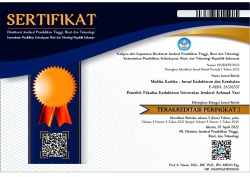PERTIMBANGAN ETIS PENGGUNAAN GANJA MEDIS DI INDONESIA
Abstract
Secara global, ganja yang dipergunakan untuk keperluan pengobatan sudah banyak mendapat legalisasi. Hal ini berbeda dengan konteks Indonesia, dimana masalah legalisasi ganja masih menjadi perdebatan. Penelitian ini bertujuan untuk mengetahui pertimbangan etis penggunaan ganja medis di Indonesia. Metode penelitian yang digunakan adalah narrative literatur review. Pencarian literatur menggunakan data base online google scholar pada artikel yang terbit dalam 10 tahun terakhir. Kata kunci sesuai tema diterapkan selama proses pencarian artikel. Total terdapat 28 artikel yang dijadikan bahan studi literatur terpilih. Hasil penelitian menunjukkan pertimbangan etis seputar penggunaan ganja medis. Simpulan dari hasil penelitian ini menunjukkan bahwa terdapat konsekuensi medis dan psikologis terhadap penggunaan ganja medis.
Kata kunci: pertimbangan etis, ganja medis, Indonesia
References
2. Aviram, J., Lewitus, G. M., Vysotski, Y., Uribayev, A., Procaccia, S., Cohen, I., ... & Meiri, D. (2020). Short-term medical cannabis treatment regimens produced beneficial effects among palliative cancer patients. Pharmaceuticals, 13(12), 435.
3. Babor, T. (2010). Drug policy and the public good. Oxford: Oxford University Press.
4. Carstairs, C. (2005). The stages of the international drug control system. Drug and alcohol review, 24(1), 57-65.
5. Csete, J., Kamarulzaman, A., Kazatchkine, M., Altice, F., Balicki, M., Buxton, J., ... & Beyrer, C. (2016). Public health and international drug policy. The Lancet, 387(10026), 1427-1480.
6. Fasinu, P. S., Phillips, S., ElSohly, M. A., & Walker, L. A. (2016). Current status and prospects for cannabidiol preparations as new therapeutic agents. Pharmacotherapy: The Journal of Human Pharmacology and Drug Therapy, 36(7), 781-796.
7. Gage, S. H., Hickman, M., & Zammit, S. (2016). Association between cannabis and psychosis: epidemiologic evidence. Biological psychiatry, 79(7), 549-556.
8. Ganzer, F., Bröning, S., Kraft, S., Sack, P. M., & Thomasius, R. (2016). Weighing the evidence: a systematic review on long-term neurocognitive effects of cannabis use in abstinent adolescents and adults. Neuropsychology review, 26(2), 186-222.
9. Gordon, D. R. (1994). The return of the dangerous classes: drug prohibition and policy politics. New York: WW Norton.
10. Gorelick, D. A., Levin, K. H., Copersino, M. L., Heishman, S. J., Liu, F., Boggs, D. L., & Kelly, D. L. (2012). Diagnostic criteria for cannabis withdrawal syndrome. Drug and alcohol dependence, 123(1-3), 141-147.
11. Ghasemiesfe, M., Ravi, D., Vali, M., Korenstein, D., Arjomandi, M., Frank, J., ... & Keyhani, S. (2018). Marijuana use, respiratory symptoms, and pulmonary function: a systematic review and meta-analysis. Annals of internal medicine, 169(2), 106-115.
12. Goodman, S., & Hammond, D. (2022). Perceptions of the health risks of cannabis: estimates from national surveys in Canada and the United States, 2018–2019. Health Education Research, 37(2), 61-78.
13. Hall, W. (2015). What has research over the past two decades revealed about the adverse health effects of recreational cannabis use?. Addiction, 110(1), 19-35
14. Hall, W., Stjepanović, D., Caulkins, J., Lynskey, M., Leung, J., Campbell, G., & Degenhardt, L. (2019). Public health implications of legalising the production and sale of cannabis for medicinal and recreational use. The Lancet, 394(10208), 1580-1590.
15. Haeuser, W., Welsch, P., Klose, P., Radbruch, L., & Fitzcharles, M. A. (2019). Efficacy, tolerability and safety of cannabis-based medicines for cancer pain. Der Schmerz, 33(5), 424-436.
16. Jünger, S., Payne, S. A., & Scholten, W. (2014). Access to opioid medication in Europe: final report and recommendations to the ministries of health.
17. Komalasari, R., Nurhayati, N., & Mustafa, C. (2022). Insider/Outsider Issues: Reflections on Qualitative Research. Qualitative Report, 27(3).
18. Komalasari, R., Wilson, S., & Haw, S. (2021). A systematic review of qualitative evidence on barriers to and facilitators of the implementation of opioid agonist treatment (oat) programmes in prisons. International Journal of Drug Policy, 87, 102978.
19. Komalasari, R., Wilson, S., & Haw, S. (2021). A social ecological model (SEM) to exploring barriers of and facilitators to the implementation of opioid agonist treatment (OAT) programmes in prisons. International Journal of Prisoner Health.
20. Komalasari, R., Wilson, S., Nasir, S., & Haw, S. (2020). Multiple burdens of stigma for prisoners participating in Opioid Antagonist Treatment (OAT) programmes in Indonesian prisons: A qualitative study. International Journal of Prisoner Health.
21. Longoria, V., Parcel, H., Toma, B., Minhas, A., & Zeine, R. (2022). Neurological Benefits, Clinical Challenges, and Neuropathologic Promise of Medical Marijuana: A Systematic Review of Cannabinoid Effects in Multiple Sclerosis and Experimental Models of Demyelination. Biomedicines, 10(3), 539.
22. Mustafa, C., Malloch, M., & Hamilton Smith, N. (2020). Judicial perspectives on the sentencing of minor drug offenders in Indonesia: discretionary practice and compassionate approaches. Crime, Law and Social Change, 74(3), 297-313.
23. Mustafa, C. (2018, December). " Punishment, in fact, did not resolve the problem": The judicial perspectives on the sentencing of minor drug offenders in Indonesia. In Papers from the British Criminology Conference (Vol. 16, pp. 93-110). British Society of Criminology.
24. Mustafa, C. (2021). The view of judicial activism and public legitimacy. Crime, Law and Social Change, 76(1), 23-34.
25. Mustafa, C. (2021). Qualitative method used in researching the judiciary: Quality assurance steps to enhance the validity and reliability of the findings. Qualitative Report, 26(1), 176-185.
26. Mustafa, C. (2021). Key finding: result of a qualitative study of judicial perspectives on the sentencing of minor drug offenders in Indonesia: structural inequality. The Qualitative Report, 26(5), 1678-1692.
27. Miller, J. (2019, March). Ethical issues arising from marijuana use by nursing mothers in a changing legal and cultural context. In HEC Forum (Vol. 31, No. 1, pp. 11-27). Springer Netherlands.
28. Nadelmann, E.A. (2004) Criminologists and punitive drug prohibition: to serve or to challenge? Criminology & Public Policy, 3(3), pp.441-450.
29. Preuss, C. V., Kalava, A., & King, K. C. (2019). Prescription of controlled substances: benefits and risks.
30. Pusiak, R. J., Cox, C., & Harris, C. S. (2021). Growing pains: An overview of cannabis quality control and quality assurance in Canada. International Journal of Drug Policy, 93, 103111.
31. Sagy, I., Peleg-Sagy, T., Barski, L., Zeller, L., & Jotkowitz, A. (2018). Ethical issues in medical cannabis use. European Journal of Internal Medicine, 49, 20-22.
32. Schwab, J. (2018). 1.2 Brief Introductions into the Most Commonly Misused and Abused Drugs. Drugs, Health & Behaviour.
33. Silins, E., Horwood, L. J., Patton, G. C., Fergusson, D. M., Olsson, C. A., Hutchinson, D. M., ... & Cannabis Cohorts Research Consortium. (2014). Young adult sequelae of adolescent cannabis use: an integrative analysis. The Lancet Psychiatry, 1(4), 286-293.
34. Stahl, R., & Hunt, G. (2001). Forces of Habit: Drugs and the Making of the Modern World. Contemporary Drug Problems, 28(4), 739.
35. Suerken, C. K., Reboussin, B. A., Egan, K. L., Sutfin, E. L., Wagoner, K. G., Spangler, J., & Wolfson, M. (2016). Marijuana use trajectories and academic outcomes among college students. Drug and alcohol dependence, 162, 137-145.
36. Suryadarma, A., & Putri, D. (2018). Integration of harm reduction into drug rehabilitation programmes in Indonesia.
37. Wallis, D., Coatsworth, J. D., Mennis, J., Riggs, N. R., Zaharakis, N., Russell, M. A., ... & Mason, M. J. (2022). Predicting self-medication with Cannabis in young adults with hazardous Cannabis use. International journal of environmental research and public health, 19(3), 1850.



























